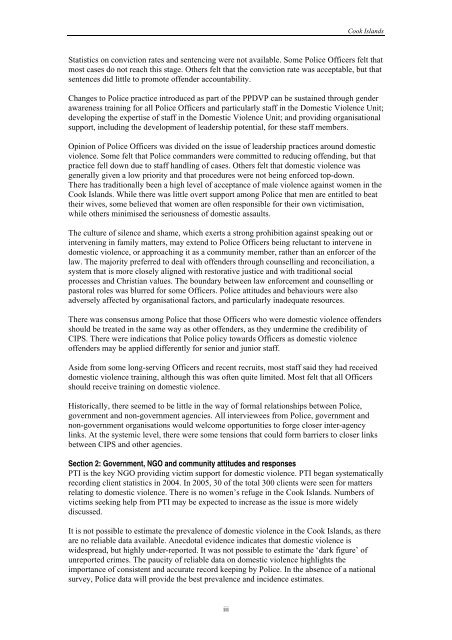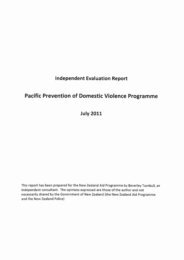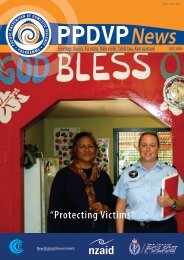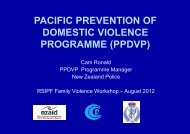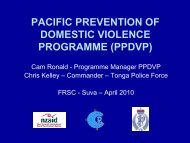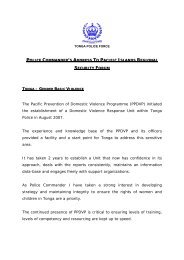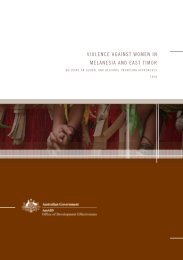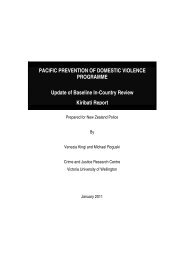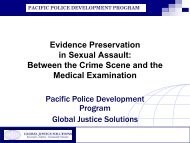Cook Islands - Pacific Prevention of Domestic Violence Programme
Cook Islands - Pacific Prevention of Domestic Violence Programme
Cook Islands - Pacific Prevention of Domestic Violence Programme
You also want an ePaper? Increase the reach of your titles
YUMPU automatically turns print PDFs into web optimized ePapers that Google loves.
<strong>Cook</strong> <strong>Islands</strong><br />
Statistics on conviction rates and sentencing were not available. Some Police Officers felt that<br />
most cases do not reach this stage. Others felt that the conviction rate was acceptable, but that<br />
sentences did little to promote <strong>of</strong>fender accountability.<br />
Changes to Police practice introduced as part <strong>of</strong> the PPDVP can be sustained through gender<br />
awareness training for all Police Officers and particularly staff in the <strong>Domestic</strong> <strong>Violence</strong> Unit;<br />
developing the expertise <strong>of</strong> staff in the <strong>Domestic</strong> <strong>Violence</strong> Unit; and providing organisational<br />
support, including the development <strong>of</strong> leadership potential, for these staff members.<br />
Opinion <strong>of</strong> Police Officers was divided on the issue <strong>of</strong> leadership practices around domestic<br />
violence. Some felt that Police commanders were committed to reducing <strong>of</strong>fending, but that<br />
practice fell down due to staff handling <strong>of</strong> cases. Others felt that domestic violence was<br />
generally given a low priority and that procedures were not being enforced top-down.<br />
There has traditionally been a high level <strong>of</strong> acceptance <strong>of</strong> male violence against women in the<br />
<strong>Cook</strong> <strong>Islands</strong>. While there was little overt support among Police that men are entitled to beat<br />
their wives, some believed that women are <strong>of</strong>ten responsible for their own victimisation,<br />
while others minimised the seriousness <strong>of</strong> domestic assaults.<br />
The culture <strong>of</strong> silence and shame, which exerts a strong prohibition against speaking out or<br />
intervening in family matters, may extend to Police Officers being reluctant to intervene in<br />
domestic violence, or approaching it as a community member, rather than an enforcer <strong>of</strong> the<br />
law. The majority preferred to deal with <strong>of</strong>fenders through counselling and reconciliation, a<br />
system that is more closely aligned with restorative justice and with traditional social<br />
processes and Christian values. The boundary between law enforcement and counselling or<br />
pastoral roles was blurred for some Officers. Police attitudes and behaviours were also<br />
adversely affected by organisational factors, and particularly inadequate resources.<br />
There was consensus among Police that those Officers who were domestic violence <strong>of</strong>fenders<br />
should be treated in the same way as other <strong>of</strong>fenders, as they undermine the credibility <strong>of</strong><br />
CIPS. There were indications that Police policy towards Officers as domestic violence<br />
<strong>of</strong>fenders may be applied differently for senior and junior staff.<br />
Aside from some long-serving Officers and recent recruits, most staff said they had received<br />
domestic violence training, although this was <strong>of</strong>ten quite limited. Most felt that all Officers<br />
should receive training on domestic violence.<br />
Historically, there seemed to be little in the way <strong>of</strong> formal relationships between Police,<br />
government and non-government agencies. All interviewees from Police, government and<br />
non-government organisations would welcome opportunities to forge closer inter-agency<br />
links. At the systemic level, there were some tensions that could form barriers to closer links<br />
between CIPS and other agencies.<br />
Section 2: Government, NGO and community attitudes and responses<br />
PTI is the key NGO providing victim support for domestic violence. PTI began systematically<br />
recording client statistics in 2004. In 2005, 30 <strong>of</strong> the total 300 clients were seen for matters<br />
relating to domestic violence. There is no women’s refuge in the <strong>Cook</strong> <strong>Islands</strong>. Numbers <strong>of</strong><br />
victims seeking help from PTI may be expected to increase as the issue is more widely<br />
discussed.<br />
It is not possible to estimate the prevalence <strong>of</strong> domestic violence in the <strong>Cook</strong> <strong>Islands</strong>, as there<br />
are no reliable data available. Anecdotal evidence indicates that domestic violence is<br />
widespread, but highly under-reported. It was not possible to estimate the ‘dark figure’ <strong>of</strong><br />
unreported crimes. The paucity <strong>of</strong> reliable data on domestic violence highlights the<br />
importance <strong>of</strong> consistent and accurate record keeping by Police. In the absence <strong>of</strong> a national<br />
survey, Police data will provide the best prevalence and incidence estimates.<br />
iii


